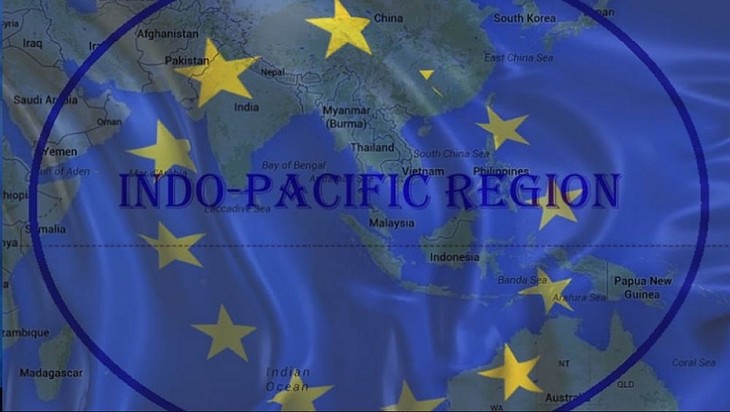(VOVWORLD) - Foreign Ministers of 27 EU countries last week adopted the “EU Strategy for Cooperation in the Indo-Pacific”, which is expected to strengthen the EU’s influence in the Indo-Pacific region, particularly with its major partners.
 The EU Strategy for Cooperation in the Indo-Pacific aims to strengthen the bloc's influence in the Indo-Pacific region. (photo: UM) The EU Strategy for Cooperation in the Indo-Pacific aims to strengthen the bloc's influence in the Indo-Pacific region. (photo: UM) |
The strategy mentions cooperation in trade, investment, climate change, freedom of navigation, and compliance with international law, and emphasizes strengthening regional security and defense partnerships and addressing maritime security, misinformation, terrorism, and organized crime.
Shifting to Asia as new geo-political center
The EU’s strategy reflects its awareness of the increasingly important role of the Indo-Pacific region and its commitments to reinforce cooperation with regional partners. The strategy creates conditions for building mutually beneficial relations between the EU and the Indo-Pacific. Regional cooperation will help the bloc carry out its global agenda, including the UN Sustainable Development Goals.
The EU’s Indo-Pacific cooperation strategy has been driven from the US’s call for its allies to strengthen their presence in the Indo-Pacific, in line with former President Trump’s “Free and Open Indo-Pacific” initiative.
The target of Washington’s strategy is to establish a dominant role in the region to maintain its economic benefits and political, military, and diplomatic power.
France was the first EU country to introduce a national strategy on the Indo-Pacific. In March, the UK pledged to shift its focus toward the Indo-Pacific region, increasingly the geopolitical centre of the world.
Reinforcing position in Indo-Pacific
The Indo-Pacific, home to half the world’s population, is becoming the center of global economic and geo-political interests. With rich natural resources, key maritime routes, and dynamic economic and trade activities, the region has become increasingly important in the 21st century.
The region is experiencing fierce competition in trade, supply chains, and the technology, politics, and security fields.
The US, Russia, China, Japan, South Korea, Australia, and India have revised their strategies to reinforce their influence and protect their interests.
Over the years, the EU has been involved in development cooperation, humanitarian support, climate change response, bio-diversity loss and pollution, and defending human rights and freedom of navigation in the Indo-Pacific.
The EU Strategy for Cooperation in the Indo-Pacific confirms its vital interests in the region and desire to work with its partners on addressing the devastating human and economic effects of the COVID19 crisis, ensuring a sustainable and inclusive green socio-economic recovery, and creating a more resilient health system.